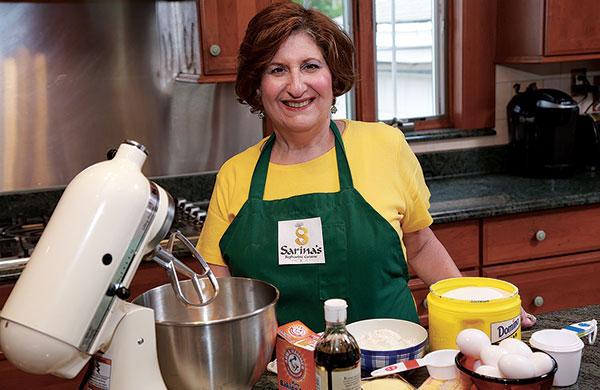Coconut Macaroons
 Macaroons originated in Naples, where there name, maccarone, meant fine paste. These are popular with French Jews, and Jews around the world.
Macaroons originated in Naples, where there name, maccarone, meant fine paste. These are popular with French Jews, and Jews around the world.
• 2 cups shredded coconut
• ½ cup sugar
• Pinch of salt
• 3 egg whites
• Chopped dried fruit, chocolate chips, or whole almonds for garnish (optional)
Preheat oven to 325˚. In a bowl, toss the coconut, sugar and salt. Add the egg whites and work them in with a wooden spoon to form a dough.
Take heaping teaspoons of dough and shape them into balls. Place on a lightly greased cookie sheet. If desired, place a piece of garnish on top of each ball. Bake for about 20 minutes or until lightly browned. Let cool for 5 minutes, then remove the macaroons to a cake rack to cool completely. Makes about 20.
Gato de Muez de Pesach
 This is a classic Passover dessert from Istanbul.
This is a classic Passover dessert from Istanbul.
• 6 eggs, separated
• 1 ¾ cups sugar
• ¾ cup ground almonds
• Grated rind and juice of 1 orange
• 1 ½ cups walnuts, coarsely chopped
• Oil and matzo meal for the cake tin
Beat the egg yolks with the sugar til light and pale. Add the ground almonds, then the orange juice and rind and the walnuts. Mix very well.
In a separate bowl, beat the egg whites stiff, and fold into the nut mixture. Oil a nonstick springform 9” cake pan and dust with matzo meal. Pour in the cake mixture and bake for 1 ½ hours in a preheated 350˚ oven. Garnish with orange slices, if desired. Serves 10.
Spanish Sponge Cake
 Sponge cake is a classic Passover dessert, with roots in the Spanish Jewish community. Here is an easy, foolproof version, with a subtle Oriental flavor.
Sponge cake is a classic Passover dessert, with roots in the Spanish Jewish community. Here is an easy, foolproof version, with a subtle Oriental flavor.
• 9 eggs, separated
• 1/3 cup matzah cake meal
• ½ cup potato starch, plus extra for the pan
• 1 cup sugar
• 1 tablespoon Passover vanilla sugar
• 2 teaspoons finely minced lemon zest
• 2 teaspoons finely minced orange zest
• 2 tablespoons lemon or orange juice
• ¼ teaspoon, plus a pinch salt
Preheat the oven to 350˚. Lightly grease an angel food pan and dust it with potato starch.
Place the egg whites over a bowl of warm water and allow them to stand for a couple of minutes to warm (or leave them at room temperature for 20 to 30 minutes).
Sift together the cake meal, potato starch, and ¼ t salt. Set aside. In one bowl, briskly whisk together the egg yolks, ½ cup of the sugar, the vanilla sugar, orange and lemon zest, and lemon or orange juice. Stir in the cake meal and potato starch and combine well.
In a mixing bowl, with clean, dry beaters, whisk the egg whites and salt together until frothy. At high speed, whip, slowly dusting in the remaining sugar, until the whites are stiff and glossy.
Mix one third of the whipped egg whites into the yolk mixture to lighten and aerate it. Then gently fold in the remaining whites, in 2 batches, to incorporate but not deflate the whites.
Gently pour the batter into the prepared pan and place in the oven. After 10 minutes, reduce the heat to 325˚ and bake until done (30 to 45 minutes) or until the cake seems firm when lightly touched.
Cool the pan by inverting onto a large plate. Cake will eventually unmold itself without losing much of its height.
This article appeared on Aish.com.


